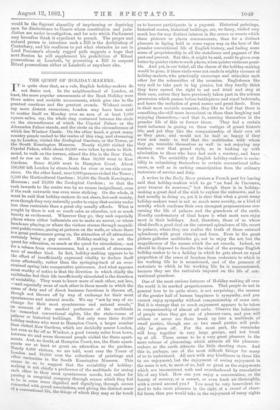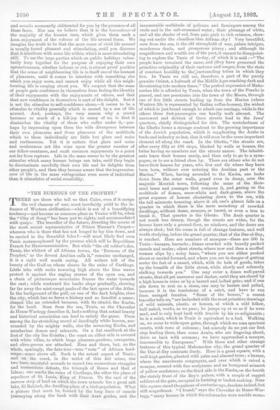THE QUEST OF HOLIDAY-MAKERS.
IT is quite clear that, as a rule, English holiday-makers do not desire rest. In the neighbourhood of London, at least, the more popular amusements of the Bank Holiday were those active and sociable amusements, which give rise to the greatest exertions and the greatest crowds. Without count- ing more distant excursions, London may have been said to scatter itself on Monday over an area of at least 1,000 square miles, say, the whole ring contained between the circle on the circumference of which the Crystal Palace or the Alexandra Palace stands, and the circle on the circumference of which lies Windsor Castle. On the other hand, a great many country people rushed to the centre of this ring, and streaming up to London, visited the Zoological Gardens, or the Tower, or the South Kensington Museum. Nearly 45,000 visited the Crystal Palace, while about 60,000 were taken by train to Rich- mond, to walk on the terrace, attend the f6te in the Deer Park, and to row on the river. More than 30,000 went to Kew Gardens. Some 40,000 went to Hampton Court. About 100,000 left London by steam-boats for river or sea-side excur- sions. On the other hand, near 9,000 persons visited the Tower ; 9,500 the Horticultural Gardens ; 16,000 the South Kensington Museum ; and 23,000 the Zoological Gardens ; so that the rush inwards to the centre was by no means insignificant, even if the rush outwards was even more striking. On the whole, it must be said that holiday-makers do not share, but seek society, even though they very naturally prefer to enjoy that society under less close restraints than a great city usually affords. What is Bought by them is not so much calm as stimulus, not so much beauty as excitement. Wherever they go, they seek especially places where either balloonists are to make an ascent, or where bands are playing, or where the visitors stream through magnifi- cent public rooms, gazing at pictures on the walls, or where there is a great performance going on, the attraction of all attractions certainly being a gay crowd. Holiday-making is not the quest for relaxation, so much as the quest for stimulation,—not for a release from strenuousness, but a pursuit of strenuous- ness of another kind. In fact, holiday-making appears to be the effort of insufficiently expressed vitality to declare itself more effectually, rather than the springing-back of an over- strained spring into comparative quiescence. And what appears most worthy of notice is that the direction in which chiefly the multitudes feel their life insufficiently stimulated is the direction of sociability. They want to know more of each other, not less, —and especially more of each other in those moods in which the sense of duty and of direct business functions is thrown off, though not thrown off by way of exchange for their most spontaneous and natural moods. We say "not by way of ex- change for their most spontaneous and natural moods," on account of the marked preference of the multitude for somewhat conventional sights, like the state-rooms of palaces or historical buildings. Not only were there 40,000 holiday-makers who went to Hampton Court, a larger number than visited Kew Gardens, which are decidedly nearer London, but even as far off as Windsor, a good twenty miles from town, between six and seven thousand people visited the State apart- ments. And, no doubt, at Hampton Court, too, the State apart- ments are at least as great an attraction as the gardens. early 9,000 visitors, we are told, went over the Tower of London and 16,000 over the collections of paintings and other curiosities in the South Kensington Museum. This seems to us to suggest ggest that the sociability of holiday- making is not chiefly aP reference of the multitude for seeing each other in their most spontaneous moods, but rather for passing in congenial dignified through scenes which they feel to be in some sense gnified and dignifying, through scenes connected with grand associations, and giving the distinct sense of a conventional life, the fringe of which they may so far touch
as to become participants in a pageant. Historical paintings, historical scenes, historical buildings, are, we fancy, visited very much less for any distinct interest iu the scenes or events which these pictures or places commemorate, than for a distinct pleasure in laying hold in some vague way on the hem of the grander conventional life of English history, and feeling some sense of proprietorship in all the stateliness and pageant of the past and present. But this, it might be said, could be given even better by quieter visits to such places, when quieter visits are possi- ble. And yet, in our belief, all the charm of the holiday-making would be gone, if these visits were not made in mighty streams of holiday-makers, who practically encourage and stimulate each other for the solemnities of the occasion. Englishmen like very well to take part in big picnics, but they hardly think they have earned the right to eat and drink and sing at their ease, unless they have previously taken part in the solemn procession which passes before battlepieces and royal bedsteads, and hears the recitation of great names and great deeds. Even in their most sociable moments, they like to feel that there is something else still more incumbent on them than laughing and enjoying themselves,—and that is, sunning themselves in the grander life of this or former times. They feel a certain tonic influence in gazing on these vestiges of grand historic life, and yet they like the companionship of their own set as they gaze, and would not be half as happy if they were not made to feel that the multitudes with whom they go, resemble themselves as well in not enjoying any mastery over that grand style, as iu looking up with admiration to those who have had such a mastery, and have shown it. The sociability of English holiday-makers is socia- bility in submitting themselves to certain conventional influ- ences, as well as in seeking emancipation from the ordinary restraints of service and duty.
A writer in the Daily News praises a French poet for having said that holiday-makers wish to go " au fond do l'inconnu, pour trouver du nouveau," but though there is in holiday- making a great deal of the wish to explore the unknown, and to find novelty in doing so, yet it is clear that what a great many holiday-makers want is not so much mere novelty, as a kind of novelty which confirms their own strongest prepossessions con- cerning the life of palaces and the grandeurs of the earth. Novelty confirmatory of ideal hopes is what most men enjoy most in their holidays. And, therefore, those of us whose ideal dwells a good deal on the outward splendours of life, resort to palaces, where they can realise the truth of those outward splendours with great vivacity and force. Even to the great picture galleries multitudes go, not to enjoy the art, but the magnificence of the scenes which the art records. Indeed, we should be disposed to describe the ideal of the average English holiday-maker to be a holiday in which he gets about an equal proportion of the sense of freedom from restraints to which in his working life he is accustomed, and of the pressure of restraints to which in his working life he is unaccustomed, because they are the restraints imposed on the life of con- ventional grandeur.
One of the most curious features of Holiday-making all over the world is its marked gregariousness. That people do not in general love to be quite alone, is not surprising ; the essence of the greater half of human happiness is sympathy, and you cannot enjoy sympathy without companionship of some sort. But it is strange that so much enjoyment appears to be taken in companionship of almost all sorts. Observe the behaviour of people when they get out of pleasure-vans, and you will seldom or never see them break up into a multitude of small parties, though one or two small parties will prob- ably be given off. For the most part, the remainder will keep together in very largo groups, and not break i
up at all. There seems to be a very great pleasure in the mere volume of pleasuring, which attracts all the pleasure- seekers as the earth attracts the little shooting stars. And this is, perhaps, one of the most difficult things for many of us to understand. All men with any kindliness in them like to see enjoyment, but the enjoyment of seeing enjoyment in the mass is not, to most of us, half as great as the enjoyments which are inconsistent with and overshadowed by cumulative life of any kind. How can you enjoy a conversation, or the beauty of scenery, or a sunset, or even fresh air thoroughly, with a crowd around you P You must be very benevolent in- deed to take more pleasure in the sight of a crowd of cheer- ful faces, than you would take in the enjoyment of many sights and sounds necessarily obliterated for you by the presence of all these faces. Nor can we believe that it is the benevolence of the majority of the human race, which gives them such a keen enjoyment of the volume of the life around them. We imagine the truth to be that the mere sense of vivid life around is usually found pleasant and stimulating, until you discover that it interferes with some life within which is more stimulating still. To see the large parties which on public holidays volun- tarily keep together for the purpose of enjoying their own uproariousness, whether indoors or out, is almost proof positive that the sense of neighbouring life is in itself one of the keenest of pleasures, until it comes to interfere with something else which you enjoy more, and cannot enjoy while all this neigh- bouring life is surging about you. We suspect that the mass of people gain confidence in themselves from feeling the identity of their enjoyments with the enjoyments of others, and that that new confidence in themselves is part of the delight. But it is not the stimulus to self-confidence alone,—it seems to be a stimulus to vitality generally which is caused by a sea of life around. And, perhaps, the very reason why a crowd becomes so much of a kill-joy to many of us, is that it diminishes the vitality of those who suffer under it,—per- haps by impressing upon them the wide divergence between their own pleasures and those pleasures of the multitude which to them individually are little but glare and noise and restlessness. Yet it is certain that glare and noise and restlessness act like wine upon the greater number of our fellow-creatures, and exalt common enjoyments to a point not far from rapture. Life in the mass seems to be the greatest stimulus which many human beings can take, until they begin to discriminate carefully their own life and its delights from other people's, and then they become aware that the impressive- ness of life in the mass extinguishes even more of individual than it stimulates of social sensibility.































 Previous page
Previous page